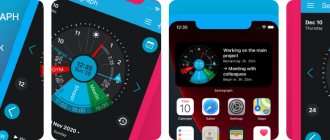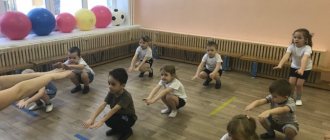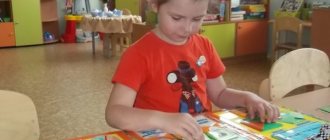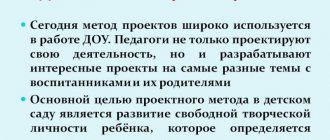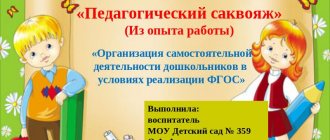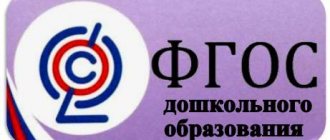Requirements for the personality of the teacher
For the full functioning of a kindergarten teacher, it is necessary to be creative and in no case dwell on previously obtained results, even if they were very significant and very high. Nowadays, a lot of attention is paid to the ability of teachers at different levels to self-educate, and this leads to the discovery and introduction into practice of innovative methods and methods of teaching and education. This approach is extremely important for working with children, because the social environment, the world around us, technology, the political situation and the requirements for teacher training are constantly changing and becoming more complex. You cannot limit yourself to knowledge acquired decades ago, as it is either outdated or has become a widely used classic. And this suggests that the new generation of children will be trained and brought up in exactly the same way as the children who attended kindergarten 5 – 10 or more years ago. During this time, the progress and requirements of pedagogical science have gone far ahead, and it is unacceptable for an educator to lag behind the existing requirements by even a year.
That is why so much attention is paid to the activity of the teaching staff of preschool educational institutions as one of the important factors in improving and improving educational work with preschoolers.
Social activity of the teacher
In the work of a teacher, social activity is manifested in creative searches, communication, and behavior. It is directly related to both working with children and interacting with other teachers, parents and guardians of students. Social activity lies in the ability to transform the world based on the development of the cultural and material wealth of the world.
The social activity of a teacher can be formulated as the main professional and personal quality of a teacher, which contributes to his professional competence in relationships with individuals, groups and teams.
A modern educator must have the ability to realize himself in any area of social activity.
Types of methodological work
Analysis of the psychological and pedagogical literature of scientific research allows us to identify different types of methodological work. According to the definition of S.Zh. Goncharova, “methodological activity is a specific type of educational activity, the content of which is the systemic unity of creating a method, its testing, introducing the method (obtaining methods), and applying methods.”
In the process of methodological activity, these spaces are interconnected into 3 stages of methodological activity, which are a single chain of certain elements, in which each stage has a final product: method, technique, guaranteed result.
It is possible to identify the main actions of the senior educator in each of these spaces.
When creating a search for a method of working with children: description, comparison, identification of patterns, expert opinion on significance, etc.
When introducing the method into the work of teachers: information, training, dissemination, experimental work, reproduction, etc.
When applying a methodology or method, the main emphasis is on control over the implementation of the main provisions and correction of this methodology.
Methodological office-center for methodological work in preschool educational institutions.
The center of all methodological work of the preschool educational institution is the methodological office. He plays a leading role in assisting teachers in organizing the educational process, ensuring their continuous professional self-development, generalizing best practices, and increasing the competence of parents in matters of raising and educating children.
The methodological classroom of a preschool institution meets such requirements as information content, accessibility, aesthetics, ensuring motivation and activity in development, and content. The implementation of the information and analytical function of managing a preschool institution determines the formation of an information data bank in the methodological room, where sources and content are determined.
All manuals and materials of the method room are intended for differentiated assistance to educators in their work with children to improve the qualifications of teaching staff, as well as to collect, study and generalize the best work experience.
In the methodological office of the preschool educational institution, exhibitions are regularly organized: ongoing and occasional. Permanent exhibitions are, for example, the following: “New Literature,” “Introduce children to nature (by season),” “To help the teacher,” and others. Only the title of the section is constant, but the material and content change.
The topics of exhibitions are very diverse, but when designing them, some recommendations are followed:
If there is a regulatory or instructional document on this topic (regulations, instructions, etc.), then a plan for its study, recommendations for teachers on working with it, experience of working with this document from other preschool educational institutions, etc. are presented.
Methodological recommendations on this topic.
Work experience related to this topic.
Literature on this topic.
Visual material related to this issue: list of equipment, diagrams, drawings, samples of crafts, paintings, slides, videos, etc.
In addition, the methodological room presents new material from various sources, attracting the attention of teachers to the problems of education and training, helping to prepare for competitions, informing about events and changes in preschool education, making them think about pedagogical situations, and reflect on their work.
